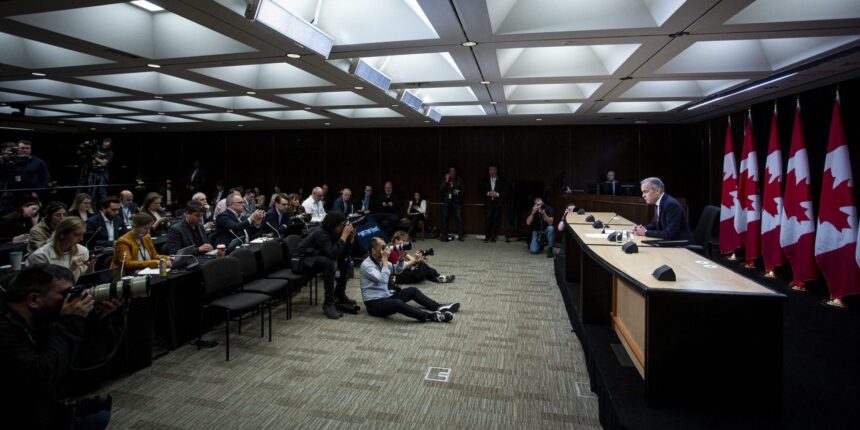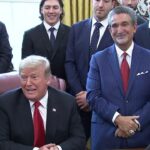In a calculated move that suggests a strategic pivot in media relations, newly elected Prime Minister Mark Carney held his first post-election press conference yesterday, extending what many observers characterized as an olive branch to the Canadian press corps. The gesture appears designed to mend fences following criticism over his election night decision to bypass traditional media channels—a move that had raised eyebrows among journalists and political analysts alike.
The packed conference room at the National Press Building in Ottawa served as the backdrop for what appeared to be Carney’s deliberate attempt to reset relations with the media establishment. The former Bank of Canada governor, who secured a decisive victory for the Liberal Party just days ago, fielded questions for nearly 90 minutes in a departure from the increasingly controlled media environments that have characterized recent Canadian political landscapes.
“The relationship between government and the fourth estate is fundamental to our democracy,” Carney stated in his opening remarks. “While we may not always agree, I respect the crucial role that journalists play in holding power to account and ensuring Canadians receive accurate information about their government’s actions.”
The press conference comes after Carney broke with longstanding tradition on election night by declining to take questions from journalists assembled at Liberal headquarters, instead opting for a brief victory speech before departing. That decision had prompted criticism from the Parliamentary Press Gallery and media watchdogs, who warned about potential implications for government transparency.
Veteran political correspondent Janet McAllister of the CO24 Politics desk noted the significance of Carney’s course correction. “Today’s extensive engagement represents a notable shift from election night. The Prime Minister appears to recognize that the traditional media remains an essential conduit to Canadians, despite the growing influence of direct communication through social media platforms.”
Carney addressed a wide range of pressing issues during the session, including his government’s plans to tackle Canada’s housing crisis, inflation concerns, and international relations. When pressed about his initial media avoidance, Carney acknowledged the criticism.
“Election night is a whirlwind, and in retrospect, I recognize the importance of those traditional exchanges with the press,” he conceded. “My commitment going forward is to maintain open lines of communication with journalists, even—perhaps especially—when the questions are difficult.”
Media relations experts suggest this approach signals Carney’s recognition of a political reality: while social media platforms offer politicians direct access to voters, traditional media outlets still play a crucial role in shaping public opinion and policy debates in the Canadian political landscape.
“This press conference represents more than just answering questions; it’s about establishing the tone for governance,” explained Dr. Helena Rousseau, media studies professor at Carleton University. “Carney is signaling that despite his background in finance and international institutions, he understands the importance of domestic media traditions and democratic norms.”
The Prime Minister’s Office has since announced plans for regular press availabilities, including the reinstatement of weekly press conferences—a practice that had diminished under previous administrations.
As Carney’s government begins to implement its ambitious agenda, the question remains: will this renewed commitment to media engagement persist through the inevitable challenges and controversies that lie ahead, or will the relationship once again revert to the more controlled communications strategy that has increasingly characterized modern politics?


















